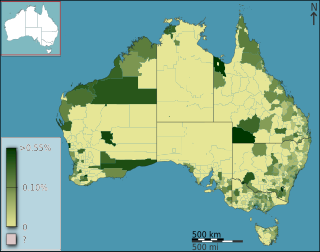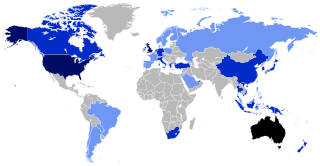History
| | This section is empty. You can help by adding to it. (July 2022) |
| Total population | |
|---|---|
| c. 12,000 | |
| Regions with significant populations | |
| Sydney and Melbourne | |
| Languages | |
| Australian English, Slovak | |
| Religion | |
| Roman Catholic (Majority) Protestantism, Judaism, Irreligion (Minority) | |
| Related ethnic groups | |
| Slovaks · Czechs · Hungarians |
Slovak Australians are Australian citizens of full or partial Slovak ancestry or a person born in Slovakia who resides in Australia. [1] Approximately 12,000 residents in Australia report to have Slovak ancestry. [2]
| | This section is empty. You can help by adding to it. (July 2022) |



The population of Australia is estimated to be 27,484,200 as of 30 October 2024. It is the 54th most populous country in the world and the most populous Oceanian country. Its population is concentrated mainly in urban areas, particularly on the Eastern, South Eastern and Southern seaboards, and is expected to exceed 30 million by 2029.

The Czechs, or the Czech people, are a West Slavic ethnic group and a nation native to the Czech Republic in Central Europe, who share a common ancestry, culture, history, and the Czech language.
Anglo-Celtic Australians is an ancestral grouping of Australians whose ancestors originate wholly or partially in the British Isles - predominantly in England, Ireland, Scotland and Wales, as well as the Isle of Man and Channel Islands.

Czech Americans, known in the 19th and early 20th century as Bohemian Americans, are citizens of the United States whose ancestry is wholly or partly originate from the Czech lands, a term which refers to the majority of the traditional lands of the Bohemian Crown, namely Bohemia, Moravia and Czech Silesia. These lands over time have been governed by a variety of states, including the Kingdom of Bohemia, the Austrian Empire, Czechoslovakia, and the Czech Republic also known by its short-form name, Czechia. Germans from the Czech lands who emigrated to the United States are usually identified as German Americans, or, more specifically, as Americans of German Bohemian descent. According to the 2000 U.S. census, there are 1,262,527 Americans of full or partial Czech descent, in addition to 441,403 persons who list their ancestry as Czechoslovak. Historical information about Czechs in America is available thanks to people such as Mila Rechcigl.

Thai Australians refers to Australians who trace their ancestry to Thailand or Thais who trace their ancestry to Australia. The Australian census recorded 45,635 Australians with Thai ancestry in the 2011 census.

Australians, colloquially known as Aussies, are the citizens, nationals and individuals associated with the country of Australia. This connection may be residential, legal, historical or ethno-cultural. For most Australians, these connections exist and are collectively the source of their being Australian. Australian law does not provide for a racial or ethnic component of nationality, instead relying on citizenship as a legal status, though the Constitutional framers considered the Commonwealth to be "a home for Australians and the British race alone", as well as a "Christian Commonwealth". Since the postwar period, Australia has pursued an official policy of multiculturalism and has the world's eighth-largest immigrant population, with immigrants accounting for 30 percent of the population in 2019.
Samoan Australians refers to Australian citizens or residents who are of ethnic Samoan descent or people born in Samoa but grew up in Australia. However, there are many New Zealand-born Samoans living in Australia, known as Samoan New Zealand Australians. Most Samoans in Australia live in Sydney, Brisbane and Melbourne. Most people of Samoan heritage speak Samoan as their first language.

English Australians, also known as Anglo-Australians, are Australians whose ancestry originates wholly or partly in England. In the 2021 census, 8,385,928 people, or 33% of the Australian population, stated that they had English ancestry. It is the largest self-identified ancestry in Australia. People of ethnic English origin have been the largest group to migrate to Australia since the establishment of the Colony of New South Wales in 1788.
Argentine Australians are Australian citizens of Argentine descent or birth. According to the Census there were 9,879 Australians who claimed full or partial Argentine ancestry and 20,940 Argentina-born citizens who were residing in Australia at the moment of the census.
Czechs in the United Kingdom refers to the phenomenon of Czech people migrating to the United Kingdom from the Czech Republic or from the political entities that preceded it, such as Czechoslovakia. There are some people in the UK who were either born in the Czech lands or have Czech ancestry, some of whom descended from Jewish refugees who arrived during World War II.

Uruguayan Australians refers to Australians of Uruguayan ancestry or birth who reside in Australia.
Colombian Australians are Australian citizens who trace their nationality or heritage from the South American nation of Colombia.

Hungarian Australians are Australian citizens of Hungarian descent. The constant influx of Hungarian immigrants was marked by several waves. Most of the Hungarian immigrants to Australia came after World War II and after the Hungarian Revolution of 1956. Hungarian Australians mostly live in state capital cities. Responses to the 2006 ABS-conducted national census questionnaires could reflect the true numbers of Hungarian Australians only if one takes into account not only those born in Hungary. In addition to that, those of ethnic Hungarian origin born outside Hungary who officially and specifically identified themselves of Hungarian ancestry would total 67,616 Hungarian Australian persons, residents of Australia as per ABS tabulation under "Hungarian Ancestry" . The breakdown according to State and Territory was: NSW 23,577; VIC 21,727; QLD 9795; SA 5,427; WA 4,230; TAS 877; ACT 1,652; NT 331. Of the 67,616 total 20,166 or 29.82% were born in Hungary, 31,103 or 46% were aged 65 and over, 40,570 or 60% had tertiary or trade qualifications. In the same 2006 Census, among Hungarian-born persons, the religious affiliation was as follows: 72.9% declared Christianity, 11.8% declared no religion or atheism, 7.4% declared Judaism, 0.6% declared other religions and 6.6% did not answer the question.
European Australians are citizens or residents of Australia whose ancestry originates from the peoples of Europe. They form the largest panethnic group in the country. At the 2021 census, the number of ancestry responses categorised within European ancestral groups as a proportion of the total population amounted to more than 57.2%. It is impossible to quantify the precise proportion of the population with European ancestry. For instance, many census recipients nominated two European ancestries, tending towards an overcount. Conversely, 29.9% of census recipients nominated "Australian" ancestry, tending towards an undercount.
Hong Kong Australians are Australian citizens or permanent residents of Hong Kong descent. Many Hong Kong Australians hold dual citizenship of Australia and China.
Slovak Canadians are citizens of Canada who were born in Slovakia or who are of full or partial Slovak ancestry. According to the 2021 Canadian census, there were 68,210 Canadians of full or partial Slovak descent.
Finnish Australians are Australian citizens of Finnish ancestry or Finland-born people who reside in Australia. According to Finnish estimates, there are approximately 30,000 Australians of Finnish ancestry, and about 7,500 Finland-born Finns residing in Australia.
Kenyan Australians are Australian citizens and residents of Kenyan origin and descent. They may be of indigenous African, European, or Indian heritage.
Lithuanian Australians refers to Australian residents of Lithuanian national background or descent. According to the 2021 Census, there were 19,430 people of Lithuanian descent in Australia and 2,582 Lithuania-born people residing in the country at the moment of the census. As of 2016, the largest Lithuanian Australian community resides in the state of New South Wales, with 1022 Lithuania-born people, especially located in Sydney.
Venezuelan Australians refers to Australian citizens of Venezuelan descent or birth. According to the 2021 Census there were 6,627 Venezuelan-born citizens who were residing in Australia at the moment of the census. There are an estimated 10,000 Australians of Venezuelan ancestry according to a study of Ivan De La Vega from Simón Bolívar University.